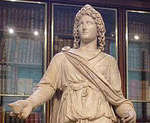
Paris
Paris was the son of King Priam and Queen Hecuba of Troy, who eloped with Helen, queen of Sparta, thus causing the events that led to the Trojan War.
Before he was born, Hecuba saw a dream in which her child was a flaming torch. The explanation to the dream that was given by the seer Aesacus was that the yet unborn child would be the doom of Troy. Aesacus also said on the day of Paris' birth that a child born of royals that day should be killed in order to save the kingdom. However, Priam and Hecuba could not kill their baby son, and instead gave the baby to a herdsman so that he would do the deed. The herdsman, also unable to kill the baby, left him to die on Mount Ida, but the boy was saved by drinking milk from a female bear. When the herdsman returned nine days later, he found the baby still alive and took him back to Troy. While growing up, Paris met the nymph Oenone, and they became lovers; after he left her for Helen, Oenone told him that she would be happy to treat all of his injuries, small or serious, whenever he was wounded.
Years later, a magnificent ceremony took place on Mount Olympus for the marriage of Peleus and Thetis. Major and minor deities had been invited, except Eris, the goddess of strife. In retribution, Eris decided to cause havoc, by throwing the Golden Apple of Discord amidst the goddesses, which was inscribed with the words "To the fairest". Hera, Athena and Aphrodite started quarreling over who should get the apple, and asked Zeus to decide. The king of the gods, knowing that his decision would bring upon him the wrath of the two discontent goddesses that would not be picked, decided to abstain. Instead, he appointed Paris to be the judge.
Paris asked the three goddesses to remove their clothes, but even so, he was unable to select the most beautiful of them, as they were all equal in beauty. That's when the goddesses decided to bribe him. Hera told him that if he picked her, she would appoint him ruler of all Europe and Asia. Athena told him he would be endowed with battle skills, wisdom and swordsmanship. Aphrodite said she would give him the most beautiful woman in the world. Paris chose Aphrodite.
The most beautiful woman in the world was Helen, queen of Sparta and wife to King Menelaus. Paris either stole Helen from Menelaus aided by Aphrodite, or Helen had already fallen for him and eloped together. After this event, Menelaus invoked the Oath of Tyndareus; this oath had been taken by all prospective suitors of Helen when she was still single, swearing that they would all protect whomever Helen would choose as her husband. As a result, the expedition to Troy was planned and the Greek forces sailed towards the western coast of Asia, thus starting the Trojan War.
Paris was considered unskilled in battle and a coward. He preferred to use a bow and arrow, which was not the weapon choice of the brave and the heroes. At some point during the war, Achilles' death was caused by an arrow that hit him on his heel; some sources claim it was Paris' shot helped by Apollo, while others claim it was Apollo transformed into Paris.
Paris was eventually mortally wounded by Philoctetes; at that point, Helen tried to find Oenone, who had promised to heal any wounds that he would suffer. However, the nymph, still angry that Paris had abandoned her for Helen, refused to give any help. Paris died that same day, and when Oenone heard about it, she threw herself in the same funeral pyre out of grief. Helen was then forced to marry Paris' brother, Deiphobus, who was killed by Menelaus after Troy fell.
See Also: Priam, Hecuba, Achilles, Zeus, Aphrodite, Hera, Athena, Oenone, Helen, Menelaus, Eris, Trojan War
Paris Q&A
Link/Cite Paris Page
Written by: The Editors of GreekMythology.com. GreekMythology.com editors write, review and revise subject areas in which they have extensive knowledge based on their working experience or advanced studies.
For MLA style citation use: GreekMythology.com, The Editors of Website. "Paris". GreekMythology.com Website, 27 Jun. 2015, https://www.greekmythology.com/Myths/Mortals/Paris/paris.html. Accessed 27 April 2024.






